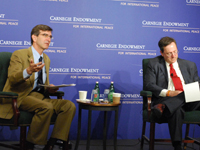Registration
You will receive an email confirming your registration.
In his speech in Prague on April 5, 2009, President Obama outlined an agenda of nuclear disarmament, nonproliferation, and counterterrorism that envisioned "the peace and security of a world without nuclear weapons." One year later, the United States and Russia have agreed to proceed with further reductions of their nuclear stockpiles under the new Strategic Arms Reduction Treaty (START).
On April 6, 2010, the administration released a Nuclear Posture Review that scaled back the role of nuclear weapons in U.S. national security policy. A Nuclear Security Summit will be convened in Washington on April 12-13, followed in May by the Nuclear Non-proliferation Treaty (NPT) Review Conference in New York. But questions remain about how much support can the President expect from influential members of the international community, and whether a divided U.S. Congress will inhibit progress towards President Obama’s vision of a nuclear-free world. George Perkovich and the David Sanger of the New York Times assessed Obama’s nuclear agenda one year after Prague.
The Nuclear Posture Review
The Nuclear Posture Review released by the Obama administration on April 6, 2010, narrowed the role of nuclear weapons in U.S. national security policy. Perkovich and Sanger discussed the likely results of the review, in the day before it was released.
- The Need for Review: Perkovich explained that the nuclear posture must be regularly reviewed because a nuclear-armed country must explain the arsenal’s purposes and future characteristics to the people who manage it, the public, and the world at large. The bureaucratic, military, and scientific actors that support the arsenal also need instructions. The posture review is a way for the President and the Secretary of Defense to lay out clear guidelines as to the purpose of the U.S. nuclear arsenal and the mission of those who support it.
- International Audience: At the same time, Perkovich said that the Posture Review has an international audience. By placing proliferation and the threat of a nuclear attack by terrorists “as the top objective and concern of U.S. nuclear policy,” the Nuclear Posture Review diminishes the prestige of nuclear weapons. Focusing on the terrorist threat highlights the danger nuclear weapons pose to global security and deemphasizes the role nuclear weapons play in U.S. national security vis-à-vis other states, particularly Russia and China, who accept mutual deterrence.
- A Lot Like No First Use: Anticipating the Nuclear Posture Review’s declaration that the United States “will not use or threaten to use” nuclear weapons against non-nuclear-weapons states who are party to the NPT and in compliance with their obligations, Perkovich said that such a declaration creates “a pretty narrow space that looks a lot like [a U.S. pledge for] no first use” with regard to almost all states, which is in fact realistic.
Prospects for Arms Control Treaties
Arms control treaties, like the new START agreement that President Obama and President Medvedev agreed to, are a crucial step along the long road toward achieving a nuclear-free world. Yet U.S. domestic politics may provide a significant stumbling block, both for the new START agreement and the pending Comprehensive Test Ban Treaty (CTBT).
- Perkovich noted that the biggest impediment to the agenda Obama laid out in Prague is the U.S. Senate. "I think there's zero chance that the CTBT will be ratified in 2010,” he said, “and I think the chances in 2011 are very difficult."
- In its campaign to persuade Senate Republicans to support the new START, the administration "has paid a big fee to the nuclear weapons laboratories…and the Department of Defense [in the form of increased funding] to upgrade the infrastructure of the U.S. nuclear weapons complex," Perkovich said. He argued that by agreeing to such concessions so early on, the President might have undermined his own chances of securing ratification for the coming CTBT.
- Moreover, Perkovich predicted international audiences will not fully grasp the complexities of American domestic politics, particularly Republican arguments that the United States needs to continue testing nuclear weapons and wonder why the United States does not ratify the treaty. "The rest of the world looks at the CTBT, for example, and says, 'wait a minute: [the U.S.] did like 1,300 nuclear weapon tests, the Chinese did something like 45, and you’re sending all this money to your weapon labs and somehow they can’t vouchsafe that the weapons will work without more testing?'" Perkovich said.
Perkovich concluded that a second Senate defeat of the Treaty—the Senate first rejected the CTBT in 1999—would be bad for U.S. world standing and the future prospects of the Treaty itself. He commented that the United States stands alongside India, Pakistan, China, and Iran as hold-outs against ratifying the treaty. Until it is ratified, Perkovich said, "the only way to go forward right now anyway is to say, this is a norm…the acceptable practice is we don’t test."
Elements of a Grand Strategy
Perkovich said he observed "elements of a grand strategy" in Obama’s nuclear agenda. The president "understands that you have to resolve these regional conflicts and tensions that are producing demand for nuclear weapons, if you’re ever going to get rid of those weapons," Perkovich said.
